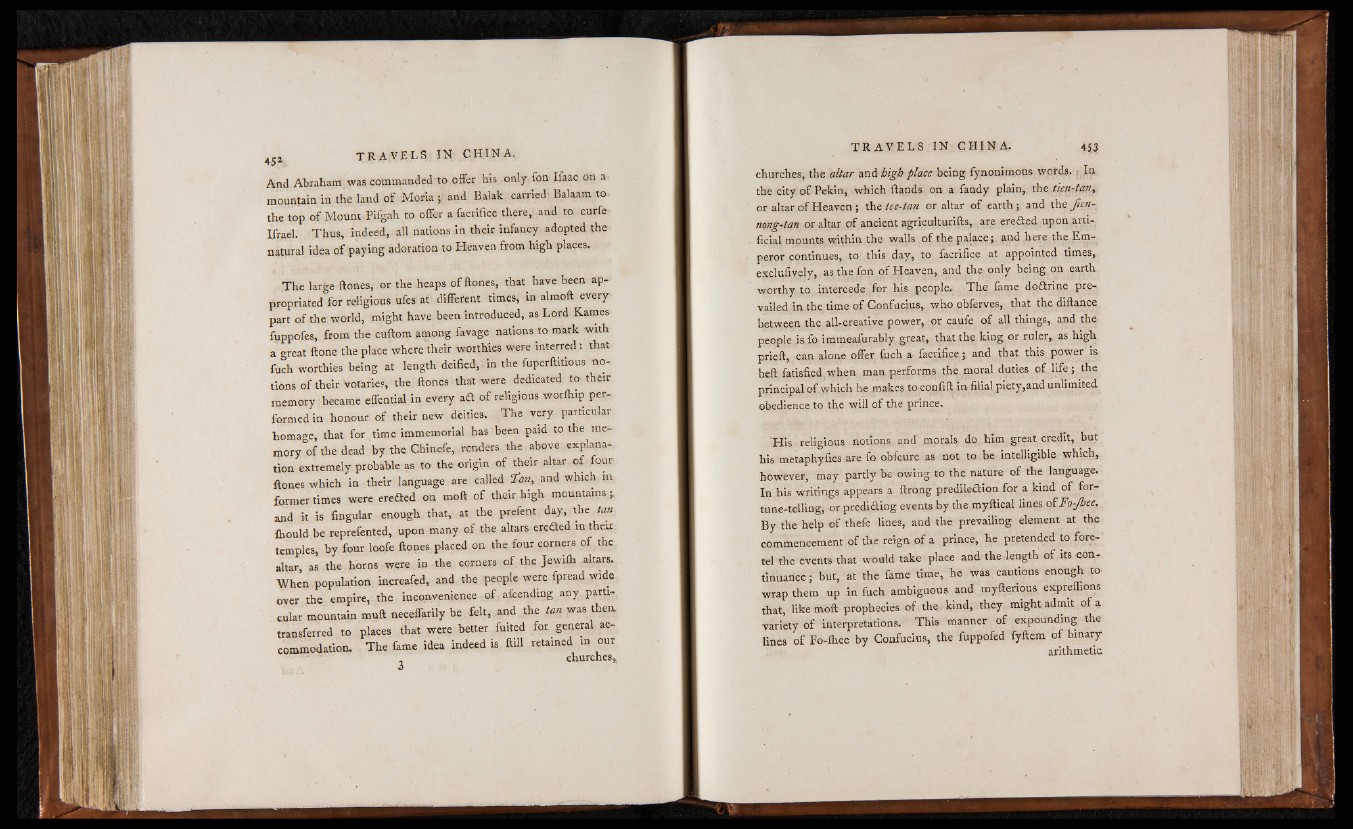
And, Abraham w a s commanded to offer his only fon Ifaac on a
mountain in the land o f Moria ; and Balak carried'Balaam to
the top o f Mount Pifgah to offer a facrifice there, and to curie
Ifrael. Thus, indeed, all nations in their infancy adopted the
natural idea o f paying adoration to Heaven from high places.
T h e large ftones, or the heaps o f ftones, that have been appropriated
for religious ufes at different times, in almoft every
part o f the world, might have been introduced, as Lord Karnes
fuppofes, from the cuftom among favage nations to mark with
a great ftone the place where their worthies were interred : that
fuch worthies being at length deified, in the fuperftitious notions
o f their votaries, the ftones that were dedicated to their
memory became effential in every atf o f religious worihip performed
in honour o f their new deities. T he very particular
homage, that for time immemorial has been paid to the memory
of the dead by the Chinefe, renders the above explana-,
tion extremely probable as to the origin o f their altar o f four
ftones which in their language are called 2 an, and which m
former times were ereifted on moft o f their high mountains
and it is fingular enough that, at the prefent day, the tan
fhould be reprefented, upon many o f the altars ere&ed in their
temples, b y four loofe ftones placed on the four corners o f the
altar as the horns were in the corners o f the Jewifli altars.
When population Lncreafed, and the people were fpread wide
over the empire, the inconvenience o f aicendmg any particular
mountain muft neceffarily be felt, and the tan was then
transferred to places that were better fuited for general accommodation.
The fame idea indeed is ftill retained in our
^ churches*
churches, the altar and high place being fynonimous words. . In
the city o f Pekin, which ftands on a fandy plain, the lien-tan,
or altar o f Heaven ; th t tee-tan or altar o f earth; and the ften-
nong-tan or altar o f ancient agriculturifts, are ereded upon artificial
mounts within the walls o f the palace; and here the Emperor
continues, to this day, to facrifice at appointed times,
exclufivejy, as the fon of H eaven, and the only being on earth
worthy to intercede for his people. The fame do&rine prevailed
in the time o f Confucius, who obferves, that the diftance
between the all-creative power, or caufe o f all things, and the
people is fo immeafurably great, that the king or ruler, as high
prieft, can alone offer filch a facrifice; and that this power is
heft fatisfied when man performs the moral duties o f life ; the
principal o f which lie makes toconfift in filial piety,and unlimited^
obedience to the will o f the prince.
His religious notions and morals do him great credit, but
his metaphyfics are fo obfcure as not to be intelligible which,
however, may partly be owing to the nature o f the language.
In his writings appears a ftrong predilection for a kind o f fortune
telling, or prediding events by the myftical lines o f Fa-Jhee.
B y the help o f thefe lines, and the prevailing element at the
commencement o f the reign o f a prince, he pretended to fore-’
tel the events that would take place and the length o f its continuance
; but, at the fame time, he was cautious enough to-
wrap them up in fuch ambiguous and myffierious expreffions
that, like moft prophecies o f the kind, they might admit o f a
variety o f interpretations. This manner o f expounding the
lines o f Fo-fliee by Confucius, the fuppofed fyftem o f binary
arithmetic